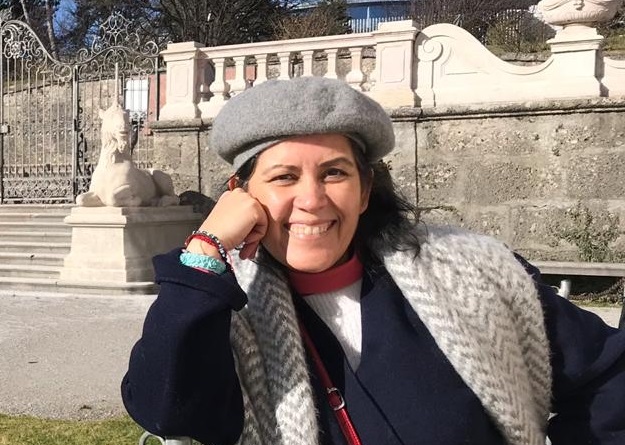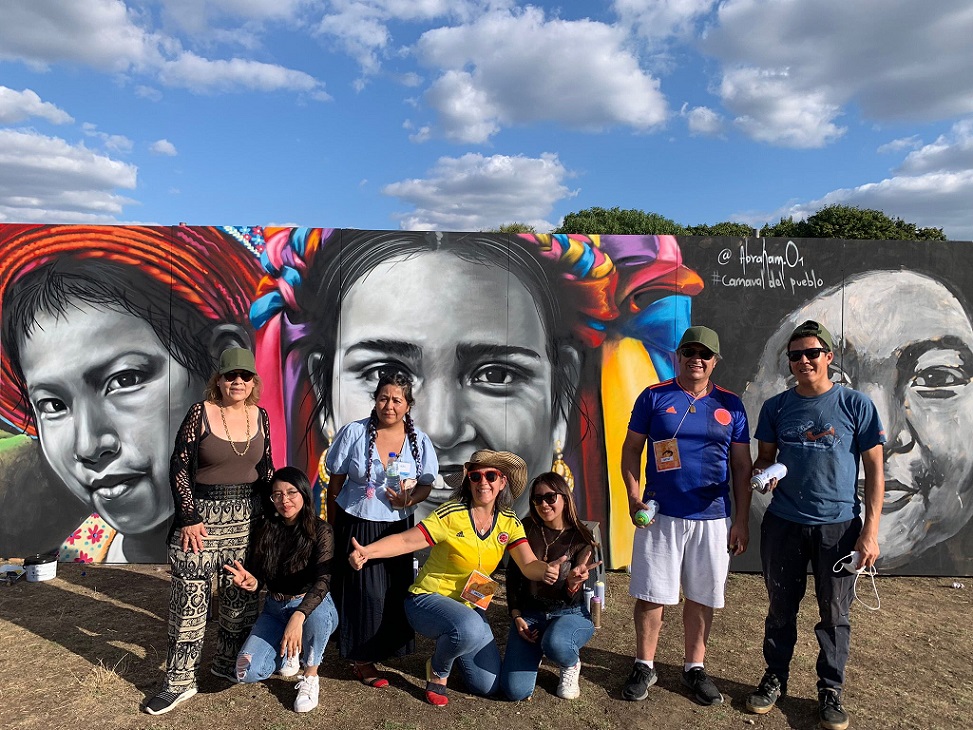Nancy Liscano has more than 20 years of experience working with Latin American immigrants in the mental health field. Originally from Colombia, her journey was marked by socio-political violence and today, working with different NGOs, she provides comprehensive therapeutic support to families in the diaspora. Her commitment, training and solidarity have marked her experience in the United Kingdom.

Josefina Viano
At the beginning of her journey, driven by the difficult context of socio-political violence in Colombia (a country that broke all records for violence in 2000, with more than 38,000 violent deaths), Nancy had to leave her homeland. She did so following her brother’s recommendation and due to security circumstances.
This stage was marked by all the feelings of those who decide to leave their place of origin, especially when that decision is surrounded by violence and instability. At the heart of this challenge was leaving her children in Colombia to settle in the UK. Another of these ever-present challenges had to do with documentation and “legality”. In her case, Nancy had to renew her student visa several times, which complicated and prolonged her journey to bring her children with her, which, “brings an extra sense of uncertainty” for her and for all migrants.
After this first stage, in 2004 she returned to Colombia, but again a tragic event of political violence, related to the situation in her country, forced her to change her plans: one of her closest companions, then a senator, was assassinated shortly after her arrival in Colombia. At that point, Nancy’s career took a decisive turning point.
 This return to her country, to work alongside the Senator, thwarted by the blow of relentless political violence, left her with no choice: she had to return to the UK and build a life and build herself there, from scratch. This is how she described those days: “I cried everywhere in the streets of London, alone, but determined to stay and start again”.
This return to her country, to work alongside the Senator, thwarted by the blow of relentless political violence, left her with no choice: she had to return to the UK and build a life and build herself there, from scratch. This is how she described those days: “I cried everywhere in the streets of London, alone, but determined to stay and start again”.
Only in 2005, she was able to count on the presence of her children, who began to grow academically in the UK. Their presence was a real relief, a great motivation and allowed her to focus a little more on her future.
Between 2003 and 2005 she also advanced her studies at the University of Madrid in the PhD in Psychological Development, Learning and Education, which allowed her to obtain her student visa. Between 2005 and 2009 Nancy worked as manager of the Anglo Spanish Nursery School.
In 2012 she continued studying at the Autonomous University of Barcelona, and obtained a master’s degree in Migrant Mental Health and a PhD in Clinical Psychology, as well as training at the Viktor Franks Institute in Logotherapy in 2014. “I always kept on studying and training, at different stages” she mentions. Nancy has worked for 15 years as an international trainer and lecturer in logotherapy.
 In the course of those years, Nancy chose to address the pain and uprooting, constantly training while helping those who, like her, were going through the migration process.
In the course of those years, Nancy chose to address the pain and uprooting, constantly training while helping those who, like her, were going through the migration process.
The emphasis was on providing comprehensive therapeutic assistance at the individual, family, community and couple levels. In this way, she is dedicated to promoting mental health in different areas: bio-cognitive, emotional, social and spiritual.
In 2004 she started “Teléfono de la Esperanza” (The hope line) which later, in 2012, was renamed “Voces amigas de esperanza – Voades” (You friends of hope), an initiative born with the purpose of helping immigrants to get through crises, to maintain hope in difficult times and to develop their personal potential.
At that time, Nancy says that more and more people were seeking emotional support, and they had to expand their assistance from telephone counselling to other activities, such as courses, workshops, seminars, meetings for the whole family. And so the group of volunteers grew as well. “It was a huge effort, very rewarding, and it also helped me personally with my own emotional needs,” she explains.
In 2014 Nancy began to have hearing problems until she became deaf, for which she had to have cochlear implants. After this, she turned her life project around and began to work as the director and founder of the Liscano Center, which Nancy defines as “a therapeutic assistance and speech therapy training company for the community on issues of emotional, social and spiritual wellbeing”.
 For Nancy, her approaches are always holistic: the situation requires it.
For Nancy, her approaches are always holistic: the situation requires it.
Immigrants often come alone, most of the time without money, without documentation, without family. Hence, approaches must be holistic, as mental health depends on a wide range of factors: the relationship with the new environment, feelings about what is left behind, links with family members present or absent, the hope of a changed future.
In her words: “The collective, the communal, is decisive in migration. The needs of immigrants are wide-ranging, and so were the responses they demanded from us. That’s why we first provided help to one member of the family, and then we took in new ones, we had to become experts in all kinds of matters and we had to do it at an accelerated pace”.
For 14 years now, Nancy has been leading the “Athena Network”, an international network of scientists, organisations and NGOs dedicated to the mental health of migrants. From there, they have had the opportunity to submit memoranda to the UN, and also to work together with the European Union, with great activism from the migrant youth belonging to Voades. The Pope received them in 2017 and it is worth mentioning that this year there will be Athena’s 14th international.
 Along the way, they have gained the support of Joseba Achitegui, author of the concept of the “Ulysses Syndrome” who has given them the responsibility of directing the Ulysses Syndrome Institute, expanding the opportunity to carry out interventions related to mental health for migrants. Always expanding seems to be her rule.
Along the way, they have gained the support of Joseba Achitegui, author of the concept of the “Ulysses Syndrome” who has given them the responsibility of directing the Ulysses Syndrome Institute, expanding the opportunity to carry out interventions related to mental health for migrants. Always expanding seems to be her rule.
Nancy chose to transform her personal experience and life into a service to others. Instead of being alone, shut-in and sad, she went out to seek out the shut-in, lonely and sad, reaching out a hand of hope, offering to share pain and joy, and to create together a new community without borders.
(Translated by Rene Phelvin – Email: renephelvin@gmail.com) – Photos supplied by the interviewee and from Pixabay












.jpg)












